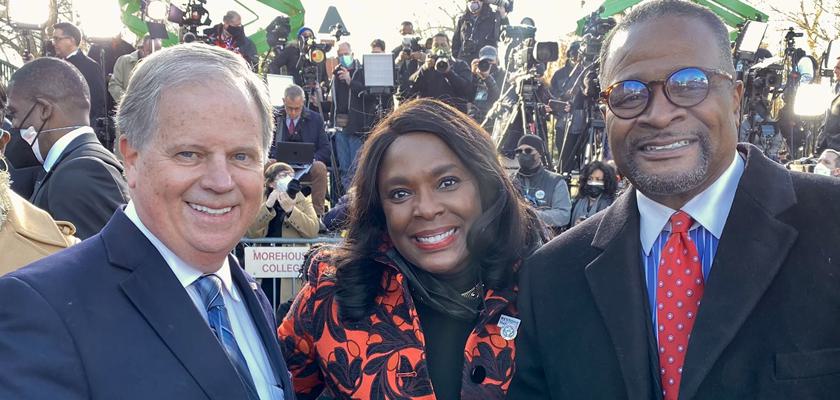President Joseph R. Biden and Vice President Kamala Harris made a stop in Atlanta on Tuesday to deliver a key speech promoting Rep. Terri Sewell’s (D-AL) voting rights bill – a top priority for the administration. Sewell traveled from Washington on Air Force One with the President and VP.
However, when they got there, some key players in Georgia didn’t show up due to “scheduling conflicts.”
Stacey Abrams, who has been on the frontlines for voting rights, didn’t show up to the event in her own state. Cliff Albright, executive director of Black Voters Matter, was also a no-show.
Biden delivered remarks about the need to pass Sewell’s H.R. 4, the John R. Lewis Voting Rights Advancement Act. The bill, which has already passed the House, would thwart state laws that Democrats claim make it harder for people to vote.
Republicans remain highly critical of H.R. 4 and its effect on state election laws – including banning Alabama’s photo ID requirement. The bill would give the federal government more control over state voting procedures, imposing a federal election code on all 50 states. Republicans characterize the proposals as federal overreach and say Democrats are giving a distorted picture of states’ attempts to bolster election integrity, citing record participation by minority voters in the 2020 election.
Those who were in attendance Tuesday included former Miles College President Dr. George T. French, former Sen. Doug Jones, and Civil Rights leaders, among others.
"Today, we call on Congress to get done what history will judge," Biden said. "Pass the Freedom to Vote Act! Pass it now! Which should prevent voter suppression."
On Aug. 24, 2021, H.R. 4 passed the House of Representatives by a vote of 219-213. On Nov. 3, 2021, it failed in the Senate after nearly every Senate Republican voted to block debate on the bill.
In the absence of robust Republican support, Sewell has led her colleagues in calling on the Senate to change Senate rules to end the filibuster so that Senate Democrats can then pass her H.R. 4.
A filibuster is a political procedure where one or more members of Congress can block a piece of legislation from coming to a vote. It takes 60 votes in the Senate to overcome a filibuster, and Democrats want the vote to be reduced to a simple majority.
President Biden said Tuesday that he supports changing the rules, despite what he has said in the past.
"Today, I'm making it clear to protect our democracy, I support changing the Senate rules whichever way they need to be changed to prevent a minority of senators from blocking action on voting rights," said Biden. "When it comes to protecting majority rule in America, the majority should rule in the United States Senate."
The statement was the opposite of what the White House said last March when White House Press Secretary Jen Psaki said, “The president’s preference is not to get rid of the filibuster. His preference is not to make different changes to the rules, to the filibuster rules.”
Senate Democrats used the filibuster themselves 327 times in 2020. There have been documented statements made in the past when Democrats have claimed they would not be in favor of changing the rules to end a filibuster.
Just one of many examples came from early 2021, when Sen. Mark Warner (D-VA) said, “During my rehiring process last year, I said it would take an awful, awful lot for me to end the filibuster. I don’t think we need to be coming in willy nilly and changing the rules.”
In late 2021, Warner released a statement saying, “The Senate has shown it cannot do its basic duty, and find 60 Senators to support basic voting rights, so I support changing the rules around the filibuster for voting rights legislation.”
Republican Congressmen Barry Moore (Al-02) and Mo Brooks (Al-05) have both released statements explaining their opposition to H.R. 4
“After failing to federalize our elections through HR1, Pelosi’s deceitful sequel is yet another unconstitutional power grab intended to keep Democrats in power,” said Moore. “Despite being named after a Civil Rights icon, the title only serves as a guise to hide Democrats’ true intentions of centralizing election power with the federal government. I cannot support this delusional attack on democracy, but I remain committed to strengthening election integrity for all Americans.”
After the President’s speech, Sen. Mitt Romney (R-Utah) said on the Senate floor that Mr. Biden was casting doubt on U.S. elections.
“This is a sad, sad day,” he said, saying he expected more of the president.
To connect with the author of this story, or to comment, email erica.thomas@1819News.com.










